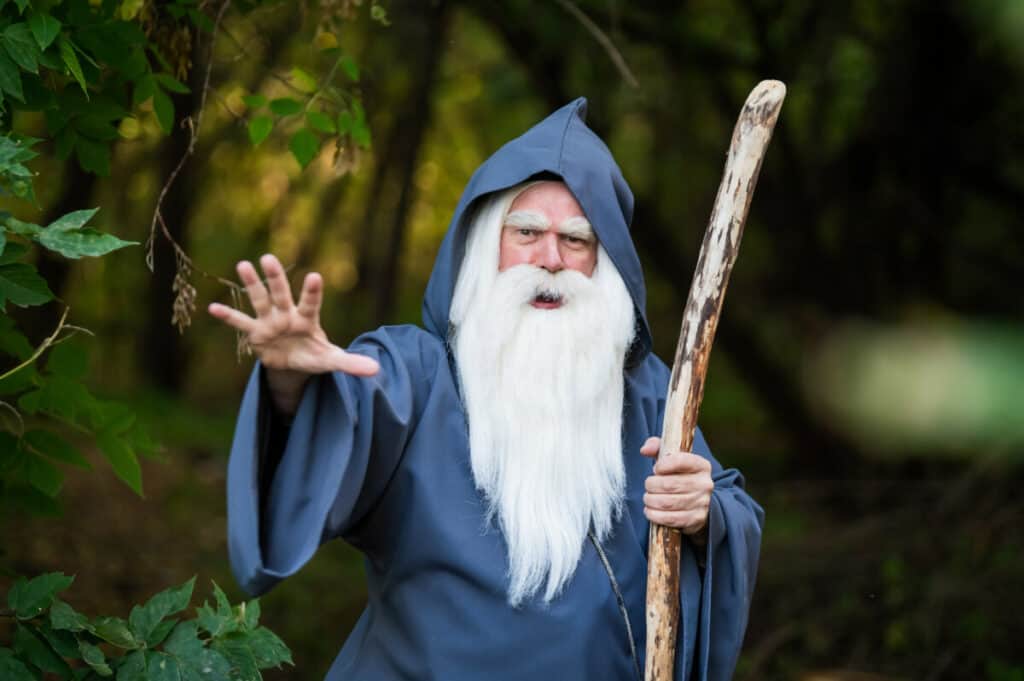Wizards, masters of the arcane, intelligent studious spellcasters who are a nightmare to deal with when they are properly prepared, every player and DM knows the potential power of a great wizard. The wizard class is all about planning, preparation, and making intelligent choices. As one of the long-time players at our table stated: “Nothing is more terrifying than a wizard who knows what’s coming and has had time to prepare accordingly.” It only makes sense that a lifetime of preparation would also include finding the best feats for every single wizard build in 5E.

Want to be a wizard for the day, and perform great feats of strength and magic? Here are some great feats for wizards that were recommended from long-time 5E Dungeons and Dragons players.
10. Magic Initiate (The Player’s Handbook)
There are some DnD wizards I know who love this for the Wizard class, and others who believe it’s one of the most overrated feats for wizards. Magic Initiate lets you add 2 cantrips and a 1st level spell that usually aren’t available to the wizard class. This can help even more powerfully create a dedicated build borrowing powerful spells or cantrips to give the ability to heal, enforce battlefield control, or even power up an Eldritch Blast which is powerfully effective at low levels.
The major drawback? Since Wizards are the only intelligence-based full caster class (Artificers are partial casters using the Wizard’s spell list) and the casting ability of the learned 2 cantrips and 1 spell are the stat of that class. So if you want to learn from the bard spell list, you have to cast those with charisma. Ditto with Warlock spells.
This adds the need to have a decent Wisdom or Charisma score since those are the ability scores that control their casting. If you started with the standard array or didn’t roll well, that could be a big ask.
9. Telekinetic (Tasha’s Cauldron of Everything)
If you’re playing Dungeons and Dragons, you have probably already heard of telekinesis. This power gives you the ability to move things with your mind, and in Dungeons and Dragons, it can help you get ahead of your opponents. You can increase Charisma, Intelligence, or Wisdom by 1 point. You can only raise on to a maximum of 20, however, so use it wisely!
With Telekineses, you also learn the Magic Hand cantrip. You get a magic hand that appears near you and you can control it like a real hand, up to 30 feet away from you! This hand can be used for all kinds of interesting and creative ways on and off the battlefield, and if you already have the Mage Hand cantrip, your version gets a longer range and able to handle more weight.
The telekinetic shove can be extremely useful, especially when the opportunity comes to shove an enemy into a trap, pit, cliff, fire, or even push a teammate out of danger (since forced movement can not force opportunity attacks). Or just pet a cat across the room so it stops jumping on your tomes while studying new spells.
Telekinetic is a great feat for a wizard! Pretty cool stuff.
8. Telepathic (Tasha’s Cauldron of Everything)
Telepathy is similar to, but not the same as, telekinesis. In the fantasy world, telepathy is the ability to read minds. In Dungeons and Dragons, the Telepathic Feat gives you 1 point in Charisma, Intelligence, or Wisdom up to a maximum of 20 points (like Telekinetic).
You can also speak telepathically with any creature you can see that’s within 60 feet of you. The limits here are that you can only speak in a language you know, and the creature may not speak that language. They must understand the language you’re speaking in to understand you – they don’t just understand you automatically.
You’ll have to figure out if they can even understand what you’re trying to say!
As for spells, you can now cast the Detect Thoughts spell. You can focus on the mind of any creature within 30 feet of you and hear their thoughts. If the creature has an Intelligence of 3 or lower, however, give up. You are not going to get anything from them. You automatically learn the surface thoughts, but if you want to dive deeper to find something specific you need to roll a wisdom check.
Just be careful, you don’t always want to know everybody’s private thoughts!

7. Tough (The Player’s Handbook)
This might be a weird pick for a wizard feat, but it makes sense in two types of builds. First of all, wizards are squishy. So if you roll good stats and have a high Intelligence and Dexterity (or Constitution) and don’t need all your Ability Scores to max those stats out, then Tough could be a great fit.
Critical extra hit points for a vulnerable conventional wizard build, or if you are going with Battle Wizard or Bladesinger then having those extra hit points matters when you’re up in the line and an attack gets past that abnormally high AC.
The Tough Feat will rarely be the best feat for a wizard in 5E, but in the right situations it can be a clever way to push up your hit points to a point that makes the difference between life and death.
6. Alert (The Player’s Handbook)
The Alert feat is what it sounds like, you are impossible to surprise. You can’t be surprised by anything while you are conscious, meaning you always get a move in a surprise round of combat, and you gain a +5 for Initiative. Because you see everything, creatures can’t get an advantage on you by being unseen. This is a good Feat for Wizards you are exploring dangerous areas and want a good defense because the adventuring party isn’t as big or bulky as a squishy wizard would like.
This Feat works in support of your party, you can figure out what they’re dealing with so they can go out and slay it, trade with it, avoid the ambush that’s coming, or otherwise work as a backup to the scout – or working with a scout. It helps build teamwork with you and your party, as it requires you to work in tandem. Alerts can keep you safe and protected from any nasty surprises.
5. War Caster (The Player’s Handbook)
War Caster makes Wizards significantly more versatile. Not only do you have advantage on saving throws to maintain concentration, but you no longer need to have free hands to perform somatic components of spells.
This may not seem like a huge deal to new players, but it makes a huge difference. Concentration spells are among the best in the game for buffing yourself or party members (and you do NOT want haste to fall in the middle of battle), and the ability to keep concentration and keep casting with enemies in your face during those FUBAR battles where the front line can’t hold – it’s great feat that will help you survive.
War caster is consistently one of the best feats for wizards in the game, and if you’ve ever played any iteration of the class, it’s not hard to see why.
4. Keen Mind (The Player’s Handbook)
Keen Mind is similar to Alert in that it gives you a better knowledge of your surroundings and can keep you safe, but it gives you different advantages. With Keen Mind, you get to increase your intelligence score to a max of 20. You also know which way is north at all times even if you are indoors, underground, etc, and the number of hours until sunrise or sunset.
So, while Alert can make you better aware of your attackers, Keen Mind gives you more information about your environment. You also get a super memory that lets you recall anything that’s happened in the past month. This is an outstanding feature that can make it much easier because you can ask the DM if any conversation in the past month mentioned this puzzle, name, or other clue.
Now you only remember conversations you’ve had. If a teammate had a conversation and accidentally gave you the wrong information, you only remember that incorrect information perfectly so it’s not a perfect divination tool – but for any conversation or scene where you were present and aware, the DM should work with you to make this work.
This was a feat that Liam O’Brien’s wizard Caleb from the second season of Critical Roll used to great effect.

3. Fey Touched (Tasha’s Cauldron of Everything)
Fey Touched gives you the classic option of adding 1 point to the max of 20 to Charisma, Intelligence, or Wisdom, as well as a few other goodies! You’ll learn the outstanding and super useful Misty Step spell, for one. The Misty Step lets you teleport to any distance you can see, provided it’s within 30 feet and unoccupied.
This allows retreat from a dangerous position, a leap to a commanding view of the battlefield, or even “warping” behind enemy spellcasters who got a little too close. This is a great way to get out of bad situations and/or redefine the battlefield positioning in an instant.
Alongside Misty Step, you can learn a 1st-level spell of your choosing that is from the Divination or Enchantment school of magic. Divination focuses on things like telling the future, stopping deceptive spells, and other magics of the mind. Enchantment deals with influence, you can charm and manipulate creatures in the game. Both are great options for becoming a more powerful Wizard and better aiding your party.
There are some exceptional spells in this list, and you get to cast that spell once for free before a long rest, and then can cast it with existing open spell slots after. The full list of spells that fall under these lists can be found in the full review (linked above).
This is one of my all-time favorite feats and one that does some seriously impressive work while also giving the ability to add in some very interesting backstory (Just what were you doing in the Fey Wild, hmmm?)
2. Spell Sniper (The Player’s Handbook)
Wizards aren’t known for being able to take hits – quite the opposite in fact. Being able to double your casting distance and ignore the enemy’s cover is a massive boon, as any Ranger who employs Sharpshooter can tell you. Being able to add serious distance to their attack spells, letting them stay further out of danger, hit enemies who would otherwise be out of range, or both.
Like the War Caster and Magic Initiate feats, Spell Sniper is one that every casting class, including the wizard, is going to at least consider with every level up to see if it fits into their build or not.
Having Spell Sniper will greatly increase the utility of Wizards for the party. By keeping their distance, and keeping safe, Wizards are able to rain in more damage per combat than they would if they take hits and go down every combat.
1. Shadow Touched (Tasha’s Cauldron of Everything)
Shadow Touched is similar to Fey Touched, but this time, you have come into contact with Shadowfell. This gives you some cool new abilities you can use to help your party. You get to add 1 point to Charisma, Intelligence, or Wisdom, to the max of 20 points.
You also get Invisibility. Invisibility means you can make a creature you touch become invisible. If they’re wearing or carrying something, that also becomes invisible. This invisibility lasts until the creature attacks or casts a spell. Like Fey Touched, you can pick a new 1st-level spell from either Illusion or Necromancy school of magic.
Illusion is what it sounds like you can deceive the minds and the sense of others, allowing you to trick them. Necromancy deals with life and death and gives you the power to control both. Being Shadow Touched means you get to try some darker tricks and spells to keep your party safe and achieve your goal by any means necessary.
Best Wizard Feats 5E: Some Parting Thoughts
Wizards can be built in so many different directions, and that is the way the class is designed. The study, the build, you can have a dozen wizards and then just don’t look the same and that is outstanding. With the largest potential for spells, the ability to move different spells in and out, and how different a prepared spell list, having the spell book – it’s pretty crazy what the wizard can do.
The wizard is a class that you can spend endless time developing in various ways to create many different memorable characters and picking these feats can help your wizard see their maximum potential.
Other DnD Articles You May Enjoy
- Best Dungeons & Dragons house rules 5th Edition
- Best Utility Spells DnD 5E
- Component Pouch Vs Arcane Focus Guide
- Best Feats for Druids
- Best Feats for Clerics
- Ritual Caster Feat Guide

Proud to embrace the locally created moniker of “Corrupt Overlord” from one of the all time great Lords of Waterdeep runs, Shane is one member of the Assorted Meeples crew and will be hard at work creating awesome content for the website. He is a long-time player of board games, one time semi-professional poker player, and tends to run to the quirky or RPG side of things when it comes to playing video games. He loves tabletop roleplaying systems like Dungeons & Dragons, Pathfinder, Werewolf, Fate, and others, and not only has been a player but has run games as DM for years. You can find his other work in publications like Level Skip or Hobby Lark.
